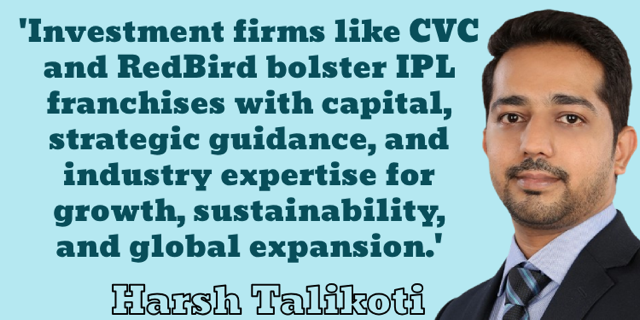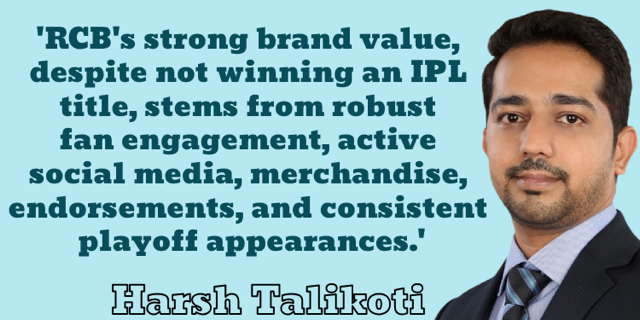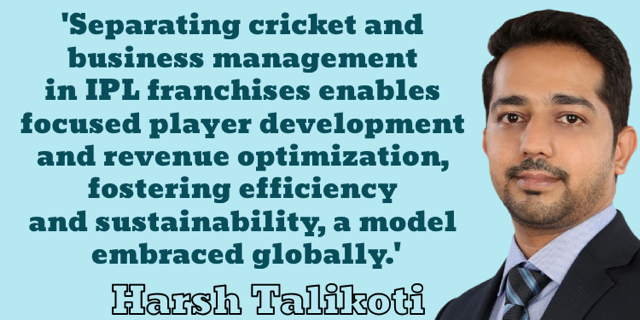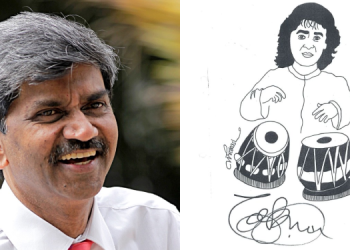The value of the T20 league the IPL as a business surged to $16.4 billion up by 6.5% (Rs. 135,000 crores), reflecting the continued strength and global appeal of the league. The IPL standalone brand value reaches $3.4 billion a growth of 6.3% over the past year. In terms of valuation, despite failing to make it to the playoffs in 2024, with a brand value of $231.0 million, Chennai Super Kings (CSK) continues to be the most valued franchisee, achieving a growth of 9% from the previous year. IPL 2024 winners, Kolkata Knight Riders, saw the highest growth, with a 19.30% rise from 2023.
Houlihan Lokey a global investment bank, recently issued the 2024 IPL Brand Valuation Study, its report into the business enterprise and brand values of the Indian Premier League (IPL).
Houlihan Lokey’s Corporate Valuation Advisory Services advises companies on all valuation matters affecting their financial reporting, tax, and strategic planning initiatives. Offerings include purchase price allocation (valuation of all acquired assets and liabilities), equity valuations for stock, and tax entity valuation for restructuring.
It has expertise in mergers and acquisitions, capital markets, financial restructuring, and financial and valuation advisory. The firm serves corporations, institutions, and governments worldwide with offices in the Americas, Europe, the Middle East, and the Asia-Pacific region.
Medianews4u.com caught up with Harsh Talikoti, Senior VP of Corporate Valuation Advisory Services at Houlihan Lokey:
Q. What factors are responsible for the growth in the IPL’s brand valuation over the years?
IPL as a league has been structured in such a way that it is hard to predict who might win in any given season, which has enhanced the fan following and general curiosity around the tournament. When the interest levels increase due to enhanced competition, this will have a spillover effect on the business side as well. That’s why we see intense bidding for media rights, sponsorship rights and even for franchisees when new franchisees are up for auction as we saw couple of years back when GT & LSG were picked up in the bid process. In short, BCCI’s ability to monetize the IPL has been the primary driver for the growth in IPL’s valuation over the years.
Q. Is it fair to say that the first five years 2008-2013 were about establishing brand IPL?
Yes, the first five years of the IPL were crucial for establishing its brand, as it was an introduction of a novel T20 league format along with aggressive marketing, high-profile sponsors, and extensive media coverage for the first time in India. This time period saw an emphasis on increasing fan engagement through in-stadium entertainment, developing strong local and regional fan bases, and assuring high-quality cricket with top international and domestic players. Professional administration and a sustainable financial model strengthened the league’s foundation, laying the groundwork for its future expansion and success.

Q. How does the IPL compare with global leagues like the EPL, NFL in terms of brand value?
The IPL has quickly established itself as one of the world’s most valuable sports leagues, with a valuation of $16.4 billion and not far behind global brands such as NFL and EPL. We haven’t attached any value to these leagues but there are various studies which have assigned multi-billion dollar values to these leagues. I would like to emphasis here that IPL is the newest amongst the top leagues and what they have achieved in such a short period of time is remarkable.
The IPL’s expansion is powered by lucrative media contracts, powerful sponsorship, and a sizable fan following, particularly in cricket-crazy India. Despite lacking the EPL’s global reach and economic impact, the IPL’s quick expansion and effective fan engagement techniques position it as a growing force in the global sports market.
Q. Even though RCB has not yet won an IPL title it is in second place in terms of team brand value. Is it because of its fan engagement activities?
Yes, RCB’s high brand value despite not winning an IPL title is largely due to its exceptional fan engagement activities. These include a strong and loyal fan base, a year wide active and innovative social media presence, wide merchandise offerings, celebrity endorsements, community engagement events, and the appeal of star players like Virat Kohli, AB de Villiers, and Chris Gayle.
These factors have collectively boosted RCB’s brand value over the years. Moreover, if you look at it from performance perspective, they have been consistent in playoff qualifications and are only the third most qualified teams after MI and CSK in IPL history.
Q. In hindsight was it a shrewd move on the part of CSK to have MS Dhoni as its face from the start in 2008 which has helped with on-field performance and brand value?
Yes, having MS Dhoni as the face of Chennai Super Kings from the start in 2008 was a great move. His exceptional leadership and calm under pressure have driven CSK’s consistent on-field success, while his immense popularity and marketability have significantly boosted the team’s brand value and fan base. This strategic decision has greatly contributed to CSK’s overall success and stability.
Q. How does having a celebrity owner like Shah Rukh Khan, Preity Zinta boost brand visibility?
Having celebrity owners boosts brand visibility by leveraging their massive fan followings, media attention, and marketing appeal. Their involvement attracts more viewers, sponsors, and media coverage, enhancing the team’s profile and reach both nationally and internationally.
Q. From an operational point of view do you think that separating the cricketing aspect (players on-field performance, grassroots activities) from the business aspect (sponsors, ticket sales strategy, licensing, and merchandising) has been important for the franchises to succeed?
Yes, separating the cricket aspect from the business aspect has been crucial for franchise success. This separation allows for specialised management in each area: coaches and sports professionals can focus on player performance and grassroots development, ensuring strong on-field results.
Meanwhile, business experts handle sponsorships, ticket sales, licensing, and merchandising, optimising revenue streams and marketing strategies. This division of responsibilities enhances efficiency, fosters professional expertise, and ultimately drives the overall growth and sustainability of the franchises. Globally this has been a model adopted by successful clubs.

Q. The league has had an auction purse from the start. So, everyone has always the same amount of money to spend. How important has having this level playing field in terms of having all strong teams (on paper) been in growing viewer interest?
This system ensures that all teams have equal financial resources to build competitive squads, leading to balanced and exciting matches. It prevents any single team from dominating due to financial superiority, thus fostering unpredictability and suspense, which are key drivers of viewer engagement. As a result, fans are more likely to tune in, knowing that any team could emerge victorious, making the league more appealing and captivating.
Q. What are the learnings from the IPL for the other Indian sports leagues?
Other Indian sports leagues can learn from the IPL by focusing on developing the game at the grassroot level, professional management, strong branding through marketing and celebrity engagement, and securing lucrative media rights. They should prioritise fan engagement via social media and community events, attract top talent for quality competition, develop robust sponsorship and merchandising strategies, and enhance the overall matchday experience to boost fan loyalty and revenue. Creating a buzz about the sport is the most important part.
Q. The IPL is free on digital. What opportunities is this offering advertisers to reach a mass audience?
The IPL being free on digital platforms offers advertisers extensive opportunities to reach a mass audience since it includes a wider and more diverse viewership. Advertisers gain from data-driven insights and targeted advertising, which allow for more tailored and effective ad campaigns. Interactive commercials and real-time engagement options increase audience interaction, whereas cost-effective digital advertising yields a higher ROI.
Enhanced measurement and analytics enable real-time performance tracking and optimisation. Furthermore, creative ad formats and social media integration increase reach and engagement, making it a very appealing platform for marketers.
Q. CVC Capital and Redbird Capital acquired stakes in IPL franchises. What value do you think they bring to the table?
Firstly, their financial resources inject additional capital into the franchises, allowing for potential expansion and enhanced team management. Beyond financial backing, these investment firms offer strategic guidance and operational expertise honed through their experience in sports and entertainment industries globally. CVC Capital, with its extensive portfolio and track record in sports investments, brings valuable insights into optimising commercial opportunities, leveraging media rights, and enhancing brand value.
Their involvement could lead to international expansion initiatives which can contribute to the long-term growth and sustainability of IPL franchises. Similarly, RedBird Capital’s expertise in sports investments and strategic partnerships can provide IPL franchises with access to a wide network of industry connections, potential sponsorship opportunities, and best practices for maximising fan engagement and revenue generation. Their focus on building big brands aligns well with the IPL’s goals of enhancing its global footprint and maintaining its position as the premier cricket league.
Moreover, the involvement of reputable investment firms like CVC Capital and RedBird Capital signals confidence in the IPL’s growth potential and long-term viability, which can boost other investor and sponsor confidence, further enhancing the franchises’ financial stability and marketability. Overall, the partnership between IPL franchises and these investment firms brings a blend of financial strength, strategic vision, and industry expertise that can drive significant value creation and propel the IPL towards continued success in the future.

Q. Going forward what are the challenges do you think the IPL faces in sustaining momentum?
Competition from other leagues, player availability due to international commitments, viewership exhaustion for the sport, maintaining continuous fan engagement and finding more revenue opportunities are some of the challenges IPL may face.

















